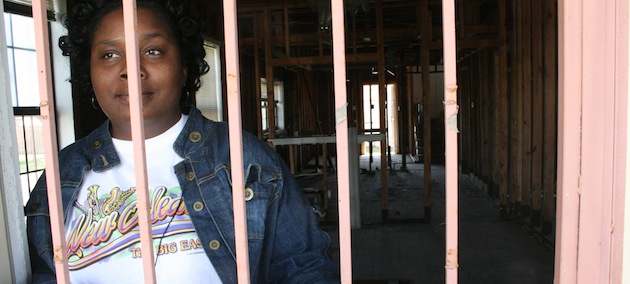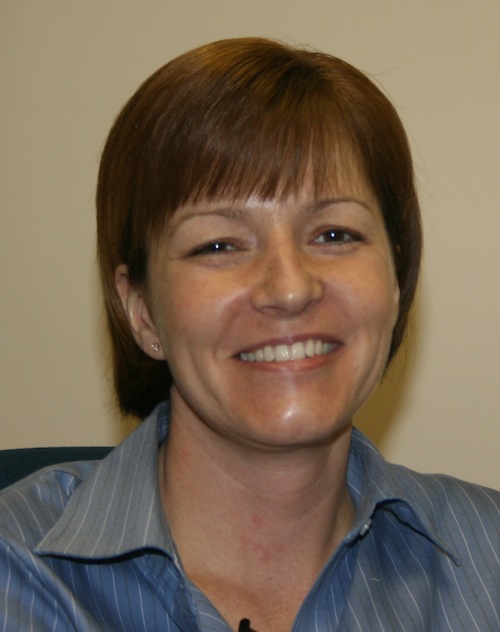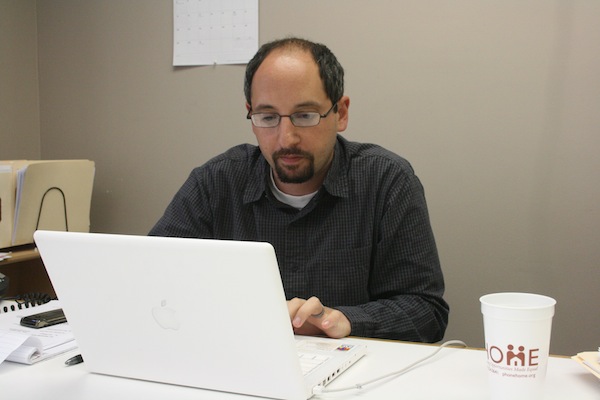
So after her workday visit to the shell of a house, Kisa Holmes heads to another part of the city, where she and her family divide time between the homes of her two sisters.
Though more complicated than most, Holmes’ story is just one of many behind the more than 40,000 blighted homes across the city, despite concerted and growing anti-blight efforts.
In a joint effort with the San Francisco-based G. W. Williams Center for Independent Journalism, The Lens sought to understand the Holmeses’ story, which illustrates how the recovery process has left some – particularly those lacking the financial literacy to navigate the convoluted system – confused and without a home.
HANDING OVER THE CHECK
After receiving approval for a loan by their bank in July 2005, Holmes, now 35, and her husband, Jewell, 33, bought the house for $113,000 and moved in soon after.
“It was exciting because we didn’t have to pay rent (anymore). We didn’t have to pay late charges,” she said.

Before they bought the house, the family had been living off of Jewell’s single income as a truck driver. Then Kisa began working with the Regional Transit Authority, and the couple’s combined income gave them the incentive to start searching for a house. They were excited about becoming homeowners despite being saddled with a 9 percent interest rate.
Like many homeowners in the confusing months after the storm, Kisa relied on her insurance company and her big-name bank and national lender, HSBC Bank, to offer guidance on her next moves.
Because the insurance check was made out to Kisa and Jewell Holmes and HSBC, all three had to sign before the check could be cashed. But feeling pressured by HSBC to pay off their mortgage rather than make repairs, Kisa and her husband signed over the check to the bank, unwittingly subjecting their family to myriad problems from that point on.
“I only did what they asked me to do,” Holmes said. “The mortgage company said in order for us to get our money, we have to pay our mortgage off and that’s what I did.”
She said she thought the bank was trying to help her.

What happened to Holmes was not an isolated incident, said Sandie McCarthy Brown, who served as executive director from 2007 to 2009 of New Orleans Pro Bono Project, which offers free legal aid. She is now an attorney with the Louisiana Supreme Court.
The Pro Bono Project served hundreds of clients after the storm that needed help with home ownership issues or working with their banks and insurance companies.
“You’re dealing with a lot of people who probably never read those documents when they got their mortgage,” McCarthy Brown said. “They just don’t know that they have a right to do things differently than it’s being done. So, when the bank tells them that it has the right to take their money and pay off their mortgage they just say, ‘Oh, OK, I believe you.’ Because they don’t know any better, they don’t know where else to turn to find out if that’s accurate or not.”
The flurry of letters and phone conversations between the Holmeses, their lender, and their insurance company all began swiftly in January 2006 and concluded just as swiftly that March. Fidelity Insurance sent the Holmeses a check for just over $135,000 on Jan. 19. Typically, Holmes would have received that check, then contacted her lender with the intent to repair her home. Her lender would hold the cash in an escrow account until it inspected the property to ensure repairs were feasible, then dole out the cash in increments once repairs were underway.
Holmes did initiate the first step of that process. Soon after receiving the check, she spoke with HSBC representatives about her next move. But it was during those phone conversations when she started feeling pressured.
“They were like, ‘Y’all in New Orleans, we don’t know what’s going to happen. Y’all don’t know what’s going to happen,” she said.
She was told that the company didn’t know whether people would be able to pay their mortgages each month, “so we have to make sure things get taken care of,” Holmes remembers the representative saying.
Though HSBC said in a letter obtained by The Lens that they did advise Holmes of the escrow option in a previous letter dated Jan. 3, 2006, Holmes said she never received it. She said she made her decision to sign over her check based solely on her phone conversations with bank personnel.
Holmes said she was also instructed to write a statement saying that she wanted to pay off her mortgage with her insurance money. Unbeknownst to her, that statement would become the technicality that ultimately trapped her in bureaucratic hell.
By March, the company sent another letter, which The Lens examined, to advise Holmes and her husband that the account was paid in full. With a few months of interest added on, she’d paid just over $118,000 on her $113,000 home, leaving her with about $16,000. She was bewildered about what had just happened with her money.
Unfortunately, Holmes didn’t understand her mortgage documents, which state HSBC had a right to take the insurance money once she put in writing that she wanted to pay off her mortgage. But even if Holmes had forbidden HSBC to pay off her mortgage, the policy spelled out other circumstances allowing the bank to take her insurance settlement.
For example, if HSBC had inspected the house and determined it couldn’t be fixed or that its value after repairs would be lower than the amount of the loan, the bank could apply the insurance proceeds toward the loan instead, according to the documents reviewed by The Lens.

Conducting inspections like this one would have been easy for local banks, which already had staff in New Orleans, said Anthony Sciortino, president and CEO of State Investors Bank in Metairie. But national banks, which held the majority of mortgages in New Orleans, had to hire adjusters to come and do the work for them – and these adjusters were hard to track down in the busy months following the storm.
Several financial experts suggested banks encouraged customers to pay off their loans to avoid the hassle of finding freelance adjusters.
Steve Bradshaw, Standard Mortgage Co.’s executive vice president, said that while he has never seen a letter from a mortgage lender to a client asking specifically for a mortgage payoff from insurance money, he can understand how a story like Holmes’ would unfold.
“I’m not surprised that there would be someone telling a customer on a telephone call that they have to pay the loan off,” he said.
Lenders also could subtly encourage a payoff by describing benefits inherent in getting a loan paid up, he said.
For instance, he said, companies could tell borrowers that paying off their mortgage would help keep their credit strong.
HSBC said it received Holmes’ letter relinquishing the insurance check on Feb. 2, 2006. Holmes did not have a copy of the letter and wrote the bank in February 2011 asking for one.
HSBC finally responded on Nov. 4, 2011, saying it could not find her letter in the files but that it had explained her options in the letter sent on Jan. 3, 2006 – the letter Holmes said she never saw.
Holmes insists that it wasn’t until after her mortgage had been paid that she called HSBC and a different agent told her she could have put the money into a repair account. But, by then, it was too late.
The bank refused to answer questions from The Lens about how it could justify using the insurance money to pay the loan when it could not provide proof of the letter. An HSBC official said it could only talk to Holmes about her case.
Several attempts to arrange a phone conversation between Holmes and HSBC were unsuccessful.
Seth Weingart, home ownership counseling supervisor of the Greater New Orleans Fair Housing Action Center, said that many clients paid off their loans with insurance money under circumstances similar to Holmes’. But others actually felt it was a good deal, especially if they had small mortgage balances or had no desire to rebuild.
State Investors Bank had approximately 2,000 loans in the areas that flooded.
Bank president Sciortino estimates about 5 percent of his customers in the flood zone paid off their mortgages with insurance proceeds. Most of them, he said, were elderly.
“They said, ‘OK, just pay off my house. I’m going to move to Kentwood, I’m going to move to Birmingham,’ or… they moved where their children were,” he said. “In that case they paid it off and just put the lot for sale or whatever. That did happen.”
A FEDERAL LOAN HOLDS SOME HOPE, THEN VANISHES
As Holmes would soon find out, voluntarily using insurance money to clear a mortgage makes obtaining further disaster aid difficult, if not impossible.
Holmes qualified for a loan from the Small Business Administration’s Disaster Loan Program for Homeowners in March 2006. She received about $54,000, which went to gutting the house and buying materials to fix it.
Shortly after, thieves broke in and stole everything, including the existing bathtub and toilet that had been ruined in the flood.
In 2007, the Road Home Program kicked in and provided homeowners with up to $150,000 to repair or rebuild their homes. Road Home told Holmes she was eligible for $50,000, and she thought they’d soon have enough money to repair the house.
“We did all our paperwork,” Holmes said. “We did everything that was presented to us. They gave us a check for $930, because, they said they had to pay the SBA loan off, because there was a duplication of benefits.”
Road Home paid $49,070 in principal and fees to retire the SBA loan.
Holmes’ letter telling HSBC to use her insurance proceeds to retire the mortgage was viewed as a voluntary payoff, said Richard Jenkins, communications director for the SBA’s Disaster Loan office in Sacramento, Calif.
“Insurance is the first line of defense against a disaster loss,” he said. “If you use your insurance money to pay back your loan voluntarily, SBA looks at that as a decision you made, because of whatever reason you wanted to clear that mortgage. But those funds that would have been available to you to make those repairs are no longer available by your choice, and SBA cannot lend for that money.”
In yet another twist, Weingart of Greater New Orleans Fair Action Housing Center, said that while many people like Holmes consented to paying off their mortgages based on dubious reasons given by their banks, there were numerous other cases where the banks used the money to pay off a loan without the homeowner’s knowledge at all.
“The borrower just got a notice in the mail that said, ‘Congratulations! Your loan has been paid off’ and they had no idea it was even happening,” Weingart said.
Experts say the banks were able to get away with these actions because of the byzantine complexities of recovery policies.
The years after Katrina were filled with uncertainty for just about everybody. Many feel the recovery program designed by the federal government was too complicated and made too many assumptions.

“I think from the get-go, the recovery system assumed a certain amount of intelligence on both sides, from the applicants’ standpoint and the reviewers’ standpoint,” said attorney Stanley Cohn, whose Lakeview house flooded.
His mortgage company demanded that he use his insurance money to pay his loan. In return he asked for, and received, a letter from the bank explaining its position.
That demand letter made him eligible for all the aid that was available, including SBA and Road Home. But he had to educate himself about both programs before he was able to get what he needed to rebuild his home.
Cohn printed out the inch-thick Road Home manual. He also printed out the 33-pages of frequently asked questions from the Road Home website. He maintains even a college graduate would have had trouble navigating the recovery systems.
“What average Joe could figure that out?” he asked. “None!
“And then you’ve got the SBA code of federal regulations. Are they going to be able to read that and understand it? Of course not! And then the SBA standard operation procedure manual, which is at least 3 or 4 inches thick: Are they going to get access to that, or know how to get access to that, and understand that? No!”
Many people contacted for this story claim they had been forced to pay off their mortgages but did not want to talk about their ordeals in depth. They said they just wanted to move on.
Attorney McCarthy Brown understands why.
“It’s like climbing a mountain times three,” she said.
“Your life has been turned totally upside down,” she said. “Most people in New Orleans have no idea how to deal with the bank – a lot of people don’t even have checking accounts. They don’t know how to deal with an insurance company. You’re not in your familiar surroundings. You may be living far away.
“By this time, you’re tired. You do not have the energy left to confront one more organization, one more bureaucracy to get what you need to get housed again.”
Holmes, however, would not give up.
LOOKING TO OTHER SOURCES FOR HELP
After receiving the paltry check from Road Home, the Holmeses began to petition various agencies that were offering help for Katrina victims. The American Red Cross, which pulls from a volunteer base to provide free aid to disaster victims, was scheduled to restore Holmes’ 9th Ward home a total of three times, she claimed. However, despite being on the list, she said, the agency cancelled the project each time before volunteers could rebuild, citing a lack of money.
Melissa Eugene-Duplantier, a spokeswoman for the Southeast Louisiana chapter of the Red Cross, said that she was unfamiliar with Holmes’ case and that client files from that time are stored in the agency’s Washington D.C. headquarters, accessible only if the organization pays by the file. She also said that most Red Cross representatives scheduling repairs for homeowners during Katrina were volunteers who have since left the organization. But she did say that they were overwhelmed with requests for help at the time, and it’s entirely possible that Holmes may have been overlooked.
Undeterred, Holmes tried other avenues. She applied for a no-interest loan program that City Hall began offering in late 2009, in which homeowners could receive up to $35,000. However, city officials said the program was strictly for the elderly and disabled.
She applied for funding through the state’s Office of Community Development Hazard Mitigation Grant Program, which offers up to $100,000 to homeowners who have to reconstruct their homes to meet elevation standards. However, she was once again derailed by the program’s refusal to duplicate federal benefits. Because she had already received cash from SBA and Road Home, she wasn’t eligible to have work done through this program. She petitioned U.S. Sen. Mary Landrieu for help with this matter. However, Landrieu’s office merely sent Holmes a letter reaffirming the state’s decision.
She contacted the United Way for Greater New Orleans, which sent her a letter in December 2010 saying that she might be a good candidate for one of their rebuilding programs.
However, just last month, Holmes received a letter telling her that her household income was too high to qualify for the aid program.
Shehad Mohammed of HSBC’s customer resolutions department wrote to Holmes recently but didn’t have much to offer.
“Ms. Holmes, we are sympathetic to your situation and regret that you were unaware that your insurance loss proceeds could have been used toward repairing your property,” he wrote. “However we are unable to offer further assistance, as the account is paid in full, and we are no longer financing consumer loans.”
For a family who thought they had finally reached their dream of home ownership, having the mortgage paid off is of little consolation at this point.
“Yes sir, I do own it,” she said. “But I don’t have the money to fix it, no sir!”
Contact Bob Butler at bobbutler7@comcast.net. Jessica Williams can be reached at jwilliams@thelensnola.org.
Funding for this story was provided by the G.W. Williams Center for Independent Journalism and the Fund for Investigative Journalism.


